

First principles of instruction. This article or chapter is incomplete and its contents need further attention.
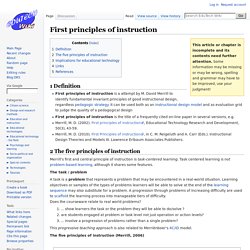
Some information may be missing or may be wrong, spelling and grammar may have to be improved, use your judgment! 1 Definition First principles of instruction is a attempt by M. David Merrill to identify fundamental invariant principles of good instructional design, regardless pedagogic strategy. It can be used both as an instructional design model and as evaluation grid to judge the quality of a pedagogical designFirst principles of instruction is the title of a frequently cited on-line paper in several versions, e.g.Merrill, M.
Article: Applying Merrill’s First Principles of Instruction: Practical Methods Based on a Review of the Literature. Pre-publication draft, reference information at end of post.To access PDF copies of this and other articles, visit my Academia.edu page.
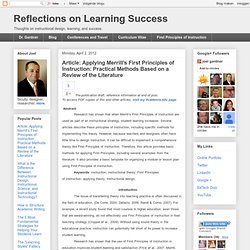
First Principles of Instruction. First Principles of Instruction, created by M.
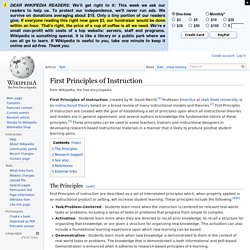
David Merrill,[1] Professor Emeritus at Utah State University, is an instructional theory based on a broad review of many instructional models and theories.[2] First Principles of Instruction are created with the goal of establishing a set of principles upon which all instructional theories and models are in general agreement, and several authors acknowledge the fundamental nature of these principles.[3] These principles can be used to assist teachers, trainers and instructional designers in developing research-based instructional materials in a manner that is likely to produce positive student learning gains.
The Principles[edit] First Principles of Instruction are described as a set of interrelated principles which, when properly applied in an instructional product or setting, will increase student learning. These principles include the following:[4][5] Research Support[edit] See also[edit] Quality eToolkit. Ask Learners to Prove They’re Learning with NEXTCHA. Ask Learners to Prove They’re Learning!
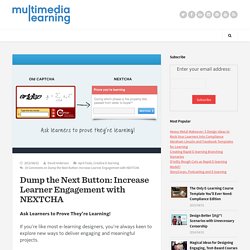
If you’re like most e-learning designers, you’re always keen to explore new ways to deliver engaging and meaningful projects. The question is: what changes in your course will make the biggest impact on the learner? Scenarios, interactivity, visual design? I say, the time’s right to liven up your course’s e-learning wallflower: the Next button!
Sad Reality of the Next Button It’s estimated that learners spend thousands of hours a year clicking next buttons. Course designers try all sorts of techniques to force learners to pay attention, like locking down courses and disabling the Next button. How-to Encourage Online Learners to take Responsibility for their Own Learning. “To single out the institution as being solely responsible for student departure, as do many critics, is to deny an essential principle of effective education, namely that students must themselves become responsible for their own learning”.
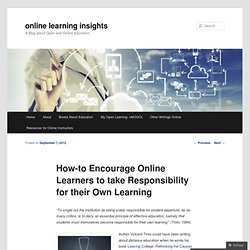
(Tinto, 1994) Author Vincent Tinto could have been writing about distance education when he wrote his book Leaving College: Rethinking the Causes and Cures of Student Attrition, but he was writing about the drop-out phenomenon in traditional colleges. Yet this quote is relevant to distance education today, perhaps even more so as educators wrestle with the high drop out rates of some online courses, specifically MOOCs.
Five-step Strategy for Student Success with Online Learning. Students that are enthusiastic about online learning cite numerous reasons for preferring the virtual format, yet it’s flexibility that is extolled most often – the ability to study and learn on ‘my time’.
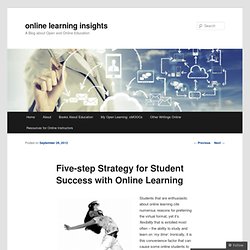
Ironically, it is this convenience factor that can cause some online students to procrastinate, or worse fail to engage in the learning process at all, which often leads to students dropping out or performing poorly. As I’ve discussed in previous posts, a key factor to student success in the online environment is self-direction, the capability and willingness to direct one’s own eduction. Online students, more so than traditional students, need to be independent and take responsibility for their learning. Self-directed learning involves a specific skill set: organization, motivation, and a sense of confidence. How to Motivate Students in the Online Learning Environment. “Correction does much, but encouragement does more“ Johann Wolfgang von Goethe.
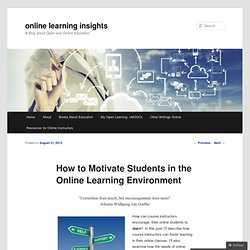
Strategies for Online Instructors: Understanding the Needs of the Online Learner. This is the first post in a four-part series that presents instructional strategies addressing the unique needs of online students.
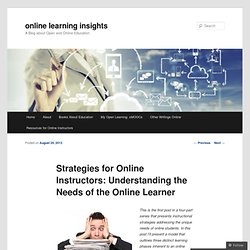
In this post I’ll present a model that outlines three distinct learning phases inherent to an online course and how instructors can support the learner through each. Cognitive overload. Strategies for Online Instruction: How-to support the Dependent Learner. This is the second post in a four-part series outlining teaching strategies for online instructors that address the unique needs of online students.
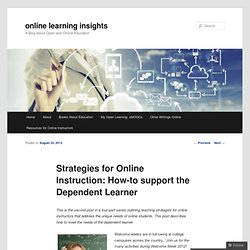
This post describes how to meet the needs of the dependent learner. Welcome weeks are in full swing at college campuses across the country, “Join us for the many activities during Welcome Week 2012! Celebrate your first night on campus with free food, laser tag …” – reads an email message to full-time college students at a well known university. This is typical of welcome week events planned for new [and returning] students. Orientation weeks are key to students’ success – familiarizing students with campus resources, creating a sense of belonging – these are just a few of the intended outcomes. Yet how does this translate to the online environment?
Phase I: The Dependent LearnerWhy is the learner so dependent in phase I? 1) The online environment. 2) Unfamiliarity with subject matter/area of study. What Institutions can DO in Phase One.